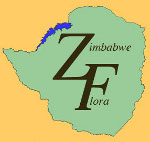Frequently asked questions
- What is this site about?
The flowering plants and ferns of Zimbabwe.
- Which plants are covered?
Primarily we deal with native and naturalised plants. In particular, the Pteridophyta (ferns and fern allies) and the Spermatophyta (seed-bearing plants). We have not covered mosses, liverworts, lichens, stoneworts or fungi.
With lower priority, we have also included some information on the cultivated plants of Zimbabwe but this part of the site is only developed to a limited degree so far.
- What is the aim of the site?
The intention is eventually to create an online flora, comprising:
- descriptions
- keys
- images
- means of naming the plants
- information about their frequency of occurrence, status, habitat, distribution and uses.
- Where is Zimbabwe?
Zimbabwe, formerly known as Rhodesia, is a country in southern Africa. It is a landlocked country and lies in the southern hemisphere tropics between approximately 15 and 22 degrees south.
- Who created the site?
The site was started by Mark Hyde in 2002 and initially consisted only of checklists of Zimbabwean plants. In January 2004, Bart Wursten and his wife Petra became involved and the site was developed into an online flora with images, descriptions and plant distributions.
In 2014, Meg Coates Palgrave joined the project and has become a major contributor.
A more detailed history of the site, its development and contents may be found on the Site history page
- Why was the site created?
Mark Hyde had lived in Zimbabwe for many years and had built up a working knowledge of the flora, together with a collection of herbarium material and numerous records of plants. Between 1992 and 2001 he had worked on a Flora of the Central Division with the aim of publishing a book, but it had become clear firstly that this was taking too long and that secondly that it would have been impossible to find finance.
This web site provides a means of publishing that information in a relatively inexpensive way.
- Who pays for the site?
The site is entirely non-profit. Costs are borne by the authors; we receive no sponsorship or support at all.
- Can I contribute to the site?
Contributions are welcome. These might be in the form of images of Zimbabwean plants, assisting with writing up genera or species or the extraction of records. There is always a lot of work to be done and any help would be welcome and will be acknowledged.
- How can I find plants on the site?
- If you know the name of the plant, that is the Latin, English, Shona or Ndebele name for the plant, you can search for it using the box in the top right of the home page.
- Note that although coverage of the Latin names of Zimbabwean native plants is reasonably complete, Latin names of the cultivated plants are still very incomplete as also are the vernacular names for all the species.
- Why create a web site (as opposed to other means of publication)?
-
- the low cost, of shared hosting services, running open source software, compared with the cost required to finance a book;
- the ability to create the work in stages;
- the possibility of a more informal approach;
- a worldwide audience;
- virtually unlimited space (50 Gb and rising) which permits easy and cost-effective presentation of both data and colour images;
- the availability of relatively cheap and high quality digital cameras;
- additional capabilities: sorting, searching etc.
- Disadvantages of the web
- less well regarded than print (not edited and not usually peer reviewed)
- mostly 1st world audience; limited Zimbabwe audience
- not very portable (despite laptops and CD versions)
- poor internet infrastructure in Zimbabwe: expensive in international terms, slow downloading; great difficulties in uploading.
- Is the creation of a web site appropriate to a developing country such as Zimbabwe?
Given that no other means was possible, this is perhaps an academic question. However, there are obviously some drawbacks:
- a low take-up of the internet;
- the relatively high costs; and
- the generally slow connection speeds.
However, one hopes that eventually such problems will be overcome.
